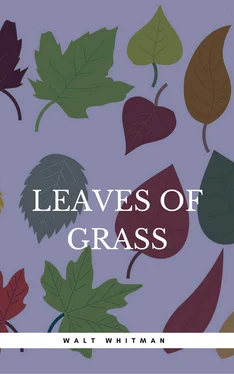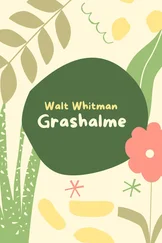Walt Whitman - Leaves of Grass
Здесь есть возможность читать онлайн «Walt Whitman - Leaves of Grass» — ознакомительный отрывок электронной книги совершенно бесплатно, а после прочтения отрывка купить полную версию. В некоторых случаях можно слушать аудио, скачать через торрент в формате fb2 и присутствует краткое содержание. ISBN: , Жанр: Языкознание, Критика, на английском языке. Описание произведения, (предисловие) а так же отзывы посетителей доступны на портале библиотеки ЛибКат.
- Название:Leaves of Grass
- Автор:
- Жанр:
- Год:неизвестен
- ISBN:9782377930524
- Рейтинг книги:4 / 5. Голосов: 1
-
Избранное:Добавить в избранное
- Отзывы:
-
Ваша оценка:
- 80
- 1
- 2
- 3
- 4
- 5
Leaves of Grass: краткое содержание, описание и аннотация
Предлагаем к чтению аннотацию, описание, краткое содержание или предисловие (зависит от того, что написал сам автор книги «Leaves of Grass»). Если вы не нашли необходимую информацию о книге — напишите в комментариях, мы постараемся отыскать её.
Leaves of Grass — читать онлайн ознакомительный отрывок
Ниже представлен текст книги, разбитый по страницам. Система сохранения места последней прочитанной страницы, позволяет с удобством читать онлайн бесплатно книгу «Leaves of Grass», без необходимости каждый раз заново искать на чём Вы остановились. Поставьте закладку, и сможете в любой момент перейти на страницу, на которой закончили чтение.
Интервал:
Закладка:
This “gigantic and generous treatment,” we presume, is offered in the pages which ensue. The poem is written in wild, irregular, unrhymed, almost unmetrical “lengths,” like the measured prose of Mr. Martin Farquhar Tupper’s Proverbial Philosophy, or some of the Oriental writings. The external form, therefore, is startling, and by no means seductive, to English ears, accustomed to the sumptuous music of ordinary metre; and the central principle of the poem is equally staggering. It seems to resolve itself into an all-attracting egotism—an eternal presence of the individual soul of Walt Whitman in all things, yet in such wise that this one soul shall be presented as a type of all human souls whatsoever. He goes forth into the world, this rough, devil-may-care Yankee; passionately identifies himself with all forms of being, sentient or inanimate; sympathizes deeply with humanity; riots with a kind of Bacchanal fury in the force and fervor of his own sensations; will not have the most vicious or abandoned shut out from final comfort and reconciliation; is delighted with Broadway, New York, and equally in love with the desolate back-woods, and the long stretch of the uninhabited prairie, where the wild beasts wallow in the reeds, and the wilder birds start upward from their nests among the grass; perceives a divine mystery wherever his feet conduct or his thoughts transport him; and beholds all things tending toward the central and sovereign Me. Such, as we conceive, is the key to this strange, grotesque, and bewildering book; yet we are far from saying that the key will unlock all the quirks and oddities of the volume. Much remains of which we confess we can make nothing; much that seems to us purely fantastical and preposterous; much that appears to our muddy vision gratuitously prosaic, needlessly plain-speaking, disgusting without purpose, and singular without result. There are so many evidences of a noble soul in Whitman’s pages that we regret these aberrations, which only have the effect of discrediting what is genuine by the show of something false; and especially do we deplore the unnecessary openness with which Walt reveals to us matters which ought rather to remain in sacred silence. It is good not to be ashamed of Nature; it is good to have an all-inclusive charity; but it is also good, sometimes, to leave the veil across the Temple.
From the Boston Intelligencer, May 3d, 1856
LEAVES OF GRASS. Brooklyn, New York, 1855.
We were attracted by the very singular title of the work, to seek the work itself, and what we thought ridiculous in the title is eclipsed in the pages of this heterogeneous mass of bombast, egotism, vulgarity, and nonsense. The beastliness of the author is set forth in his own description of himself, and we can conceive no better reward than the lash for such a violation of decency as we have before us. Speaking of “this mass of stupid filth,” the Criterion says: “It is impossible to imagine how any man’s fancy could have conceived it, unless he were possessed of the soul of a sentimental donkey that had died of disappointed love.”
This book should find no place where humanity urges any claim to respect, and the author should be kicked from all decent society as below the level of the brute. There is neither wit nor method in his disjointed babbling, and it seems to us he must be some escaped lunatic, raving in pitiable delirium.
May be ordered at any Book-Store or Newspaper Depot, or especially of
Their place of business is the principal Agency for the Work, wholesale and retail. A note written to them, giving the writer’s address, and enclosing $1 00, will procure a bound copy, post-paid, by return mail.
They supply Booksellers at a liberal discount.
‘LEAVES OF GRASS’ may also be purchased or ordered by mail, or the country-trade supplied, from the following Agencies:
BOSTON, Fowler, Wells & Co., 142 Washington St.
PHILADELPHIA, Fowler, Wells & Co., 231 Arch street.
BALTIMORE, J. W. Bond & Co.
TORONTO, (Ca.,) Maclear & Co.
BUFFALO, T. S. Hawks.
BUFFALO, A. Burke, Jr.
CINCINNATI, F. Bly.
CHICAGO, R. Blanchard.
ST. LOUIS E. K. Woodward.
NEW ORLEANS, J. C. Morgan.
SAN FRANCISCO, George M. Bourne, M.D.
LONDON, Horsell & Co., Oxford St.
PARIS, H. Bailliere & Co.
BRUSSELS, William Good, Antwerp.
☞ Any communication by mail, for the author of Leaves of Grass, can be directed to him, namely,
Walt Whitman , care of
LEAVES OF GRASS
1860
PROTO-LEAF
1860:2
1 Free , fresh, savage,
Fluent, luxuriant, self-content, fond of persons and places,
Fond of fish-shape Paumanok, where I was born,
Fond of the sea—lusty-begotten and various,
Boy of the Mannahatta, the city of ships, my city,
Or raised inland, or of the south savannas,
Or full-breath’d on Californian air, or Texan or Cuban air,
Tallying, vocalizing all—resounding Niagara—resounding Missouri,
Or rude in my home in Kanuck woods,
Or wandering and hunting, my drink water, my diet meat,
Or withdrawn to muse and meditate in some deep recess,
Far from the clank of crowds, an interval passing, rapt and happy,
Stars, vapor, snow, the hills, rocks, the Fifth Month flowers, my amaze, my love,
Aware of the buffalo, the peace-herds, the bull, strong-breasted and hairy,
Aware of the mocking-bird of the wilds at daybreak,
Solitary, singing in the west, I strike up for a new world.
2 Victory, union, faith, identity, time, the Soul, yourself, the present and future lands, the indissoluble compacts, riches, mystery, eternal progress, the kosmos, and the modern reports.
3 This then is life,
Here is what has come to the surface after so many throes and convulsions.
4 How curious! How real!
Underfoot the divine soil—Overhead the sun.
5 See, revolving,
The globe—the ancestor-continents, away, grouped together,
The present and future continents, north and south, with the isthmus between.
6 See, vast, trackless spaces,
As in a dream, they change, they swiftly fill,
Countless masses debouch upon them,
They are now covered with the foremost people, arts, institutions known.
7 See projected, through time,
For me, an audience interminable.
8 With firm and regular step they wend—they never stop,
Successions of men, Americanos, a hundred millions,
One generation playing its part and passing on,
And another generation playing its part and passing on in its turn,
With faces turned sideways or backward toward me to listen,
With eyes retrospective toward me.
9 Americanos! Masters!
Marches humanitarian! Foremost!
Century marches! Libertad! Masses!
For you a programme of chants.
Интервал:
Закладка:
Похожие книги на «Leaves of Grass»
Представляем Вашему вниманию похожие книги на «Leaves of Grass» списком для выбора. Мы отобрали схожую по названию и смыслу литературу в надежде предоставить читателям больше вариантов отыскать новые, интересные, ещё непрочитанные произведения.
Обсуждение, отзывы о книге «Leaves of Grass» и просто собственные мнения читателей. Оставьте ваши комментарии, напишите, что Вы думаете о произведении, его смысле или главных героях. Укажите что конкретно понравилось, а что нет, и почему Вы так считаете.












